Deck 4: Graphing and Inverse Functions
Question
Question
Question
Question
Question
Question
Question
Question
Question
Question
Question
Match between columns
Question
Match between columns
Question
Question
Question
Question
Question
Question
Question
Match between columns
Question
Question
Question
Question
Question
Question
Match between columns
Question
Question
Question
Question
Question
Question
Question
Question
Question
Question
Question
Question
Question
Question
Match between columns
Question
Question
Question
Question
Question
Question
Question
Question
Question
Question
Question
Question
Question
Question
Question
Question
Question
Question
Question
Question
Question
Question
Question
Question
Question
Question
Question
Question
Question
Question
Question
Question
Question
Question
Question
Question
Question
Question
Question
Question
Question

Unlock Deck
Sign up to unlock the cards in this deck!
Unlock Deck
Unlock Deck
1/156
Play
Full screen (f)
Deck 4: Graphing and Inverse Functions
1
Use your graphing calculator to graph the pair of functions for  together on a single coordinate system. (Make sure your calculator is set to radian mode.)
together on a single coordinate system. (Make sure your calculator is set to radian mode.) 
A)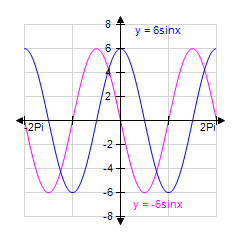
B)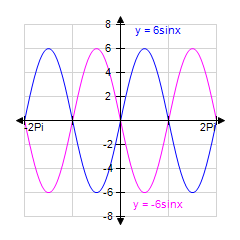
C)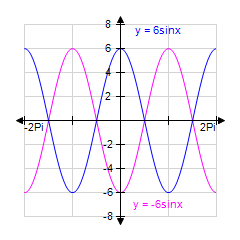
D)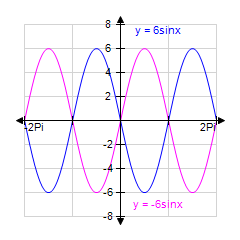
E)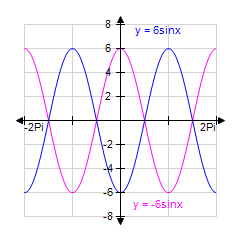
 together on a single coordinate system. (Make sure your calculator is set to radian mode.)
together on a single coordinate system. (Make sure your calculator is set to radian mode.) 
A)

B)

C)

D)

E)



2
Sketch the graph of y = csc x between x = -4 π and x = 4 π by extending the graph for x between 0 and 2 π . 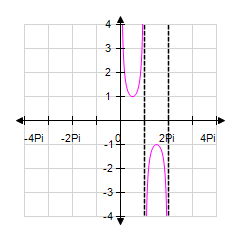
A)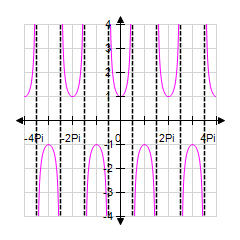
B)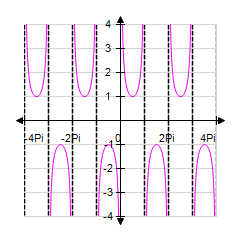
C)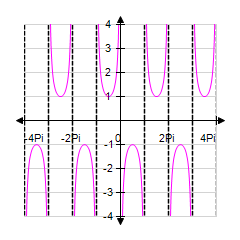
D)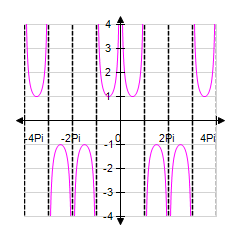
E)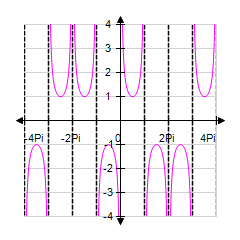

A)

B)

C)

D)

E)



3
If  , find sin(- θ ).
, find sin(- θ ).
 , find sin(- θ ).
, find sin(- θ ).
4
Find all values of x for which the following is true. sin x = 1
A)kπ
B)
C)
D)
E)
A)kπ
B)

C)

D)

E)


Unlock Deck
Unlock for access to all 156 flashcards in this deck.
Unlock Deck
k this deck
5
Evaluate without using a calculator. 
A)
B)
C)
D)
E)

A)

B)

C)

D)

E)


Unlock Deck
Unlock for access to all 156 flashcards in this deck.
Unlock Deck
k this deck
6
Find the algebraic expression that is equal to cos (180° - θ ).
A)
B)-sin θ
C)sin θ
D)-cos θ
E)cos θ
A)

B)-sin θ
C)sin θ
D)-cos θ
E)cos θ

Unlock Deck
Unlock for access to all 156 flashcards in this deck.
Unlock Deck
k this deck
7
Use your graphing calculator to graph the family of functions for  together on a single coordinate system. (Make sure your calculator is set to radian mode.) y = A sin x for A = 1, 4, 6
together on a single coordinate system. (Make sure your calculator is set to radian mode.) y = A sin x for A = 1, 4, 6
A)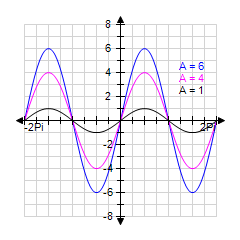
B)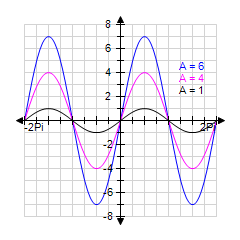
C)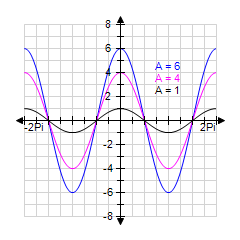
D)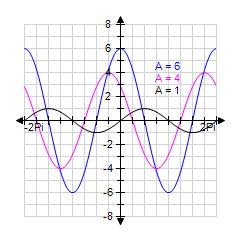
E)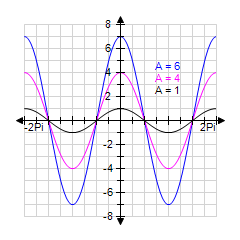
 together on a single coordinate system. (Make sure your calculator is set to radian mode.) y = A sin x for A = 1, 4, 6
together on a single coordinate system. (Make sure your calculator is set to radian mode.) y = A sin x for A = 1, 4, 6
A)

B)

C)

D)

E)


Unlock Deck
Unlock for access to all 156 flashcards in this deck.
Unlock Deck
k this deck
8
Use your graphing calculator to graph the pair of functions for  . (Make sure your calculator is set to radian mode.) y = cos Bx for B = 1, 3
. (Make sure your calculator is set to radian mode.) y = cos Bx for B = 1, 3
A)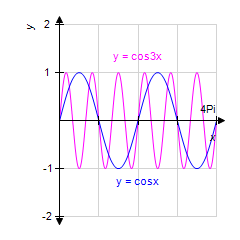
B)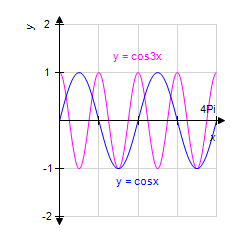
C)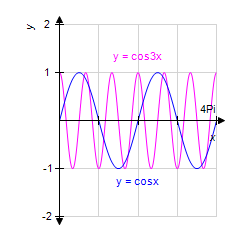
D)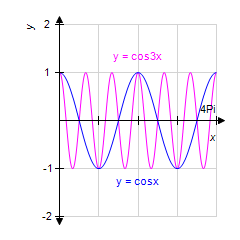
E)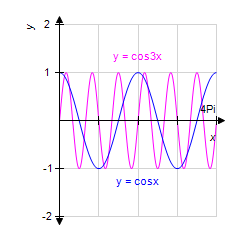
 . (Make sure your calculator is set to radian mode.) y = cos Bx for B = 1, 3
. (Make sure your calculator is set to radian mode.) y = cos Bx for B = 1, 3
A)

B)

C)

D)

E)


Unlock Deck
Unlock for access to all 156 flashcards in this deck.
Unlock Deck
k this deck
9
Prove the identity.
cos(- β )csc( - β )tan( - β )= 1
cos(- β )csc( - β )tan( - β )= 1

Unlock Deck
Unlock for access to all 156 flashcards in this deck.
Unlock Deck
k this deck
10
Find all values of x for which the following is true: sec x = -1
A)
B)
C)
D)
E)
A)

B)

C)

D)

E)


Unlock Deck
Unlock for access to all 156 flashcards in this deck.
Unlock Deck
k this deck
11
Match between columns

Unlock Deck
Unlock for access to all 156 flashcards in this deck.
Unlock Deck
k this deck
12
Match between columns

Unlock Deck
Unlock for access to all 156 flashcards in this deck.
Unlock Deck
k this deck
13
Sketch the graph of y = cos x between x = -4 π and x = 4 π by extending the graph for x between 0 and 2 π . 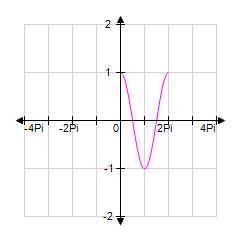
A)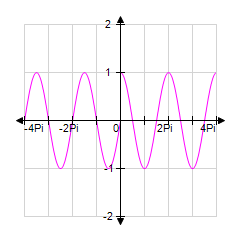
B)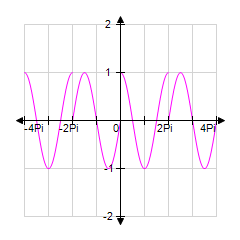
C)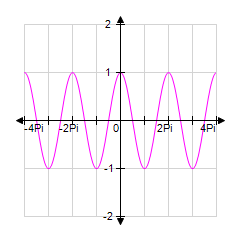

A)

B)

C)


Unlock Deck
Unlock for access to all 156 flashcards in this deck.
Unlock Deck
k this deck
14
Prove the identity. 


Unlock Deck
Unlock for access to all 156 flashcards in this deck.
Unlock Deck
k this deck
15
Use your graphing calculator to graph the pair of functions for  together on a single coordinate system. (Make sure your calculator is set to radian mode.)
together on a single coordinate system. (Make sure your calculator is set to radian mode.) 
A)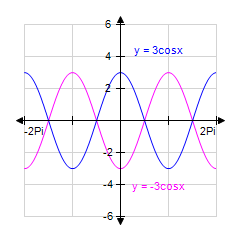
B)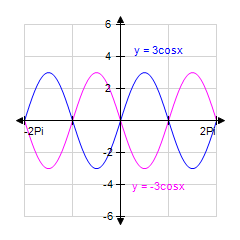
C)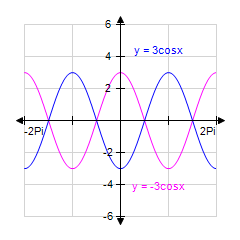
D)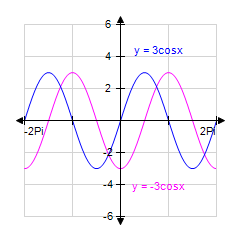
E)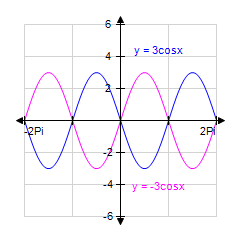
 together on a single coordinate system. (Make sure your calculator is set to radian mode.)
together on a single coordinate system. (Make sure your calculator is set to radian mode.) 
A)

B)

C)

D)

E)


Unlock Deck
Unlock for access to all 156 flashcards in this deck.
Unlock Deck
k this deck
16
Find the algebraic expression that is equal to sec θ - cos(- θ ).
A)
B)
C)
D)tan 2 θ
E)
A)

B)

C)

D)tan 2 θ
E)


Unlock Deck
Unlock for access to all 156 flashcards in this deck.
Unlock Deck
k this deck
17
If  , find cos (- θ ).
, find cos (- θ ).
A)
B)
C)04
D)
E)
 , find cos (- θ ).
, find cos (- θ ). A)

B)

C)04
D)

E)


Unlock Deck
Unlock for access to all 156 flashcards in this deck.
Unlock Deck
k this deck
18
Find all values of x for which the following is true. sec x is undefined.
A)
B)
C)
D)
E)
A)

B)

C)

D)

E)


Unlock Deck
Unlock for access to all 156 flashcards in this deck.
Unlock Deck
k this deck
19
Match between columns

Unlock Deck
Unlock for access to all 156 flashcards in this deck.
Unlock Deck
k this deck
20
Find the algebraic expression that is equal to sin(- θ )sec( - θ )cot( - θ ).
A)1
B)sec( - θ )
C)csc( - θ )
D)cos( - θ )
E)sin( - θ )
A)1
B)sec( - θ )
C)csc( - θ )
D)cos( - θ )
E)sin( - θ )

Unlock Deck
Unlock for access to all 156 flashcards in this deck.
Unlock Deck
k this deck
21
Identify the graph of the function 
A)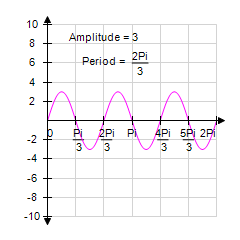
B)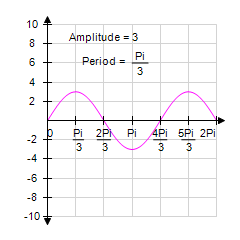
C)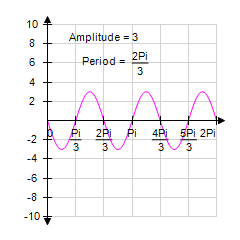
D)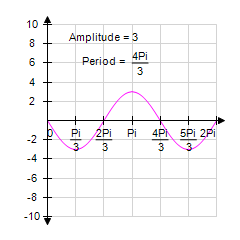
E)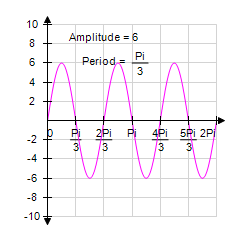

A)

B)

C)

D)

E)


Unlock Deck
Unlock for access to all 156 flashcards in this deck.
Unlock Deck
k this deck
22
Identify the graph of the function. y = cos 3 x
A)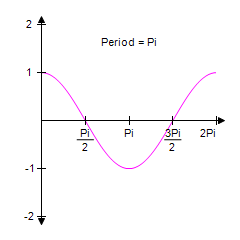
B)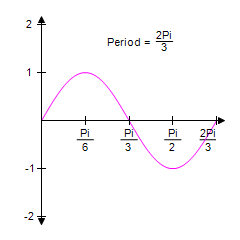
C)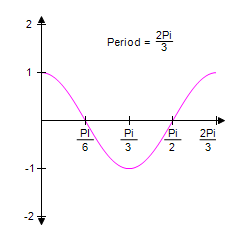
D)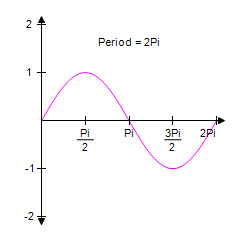
E)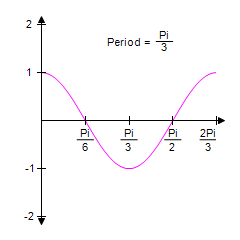
A)

B)

C)

D)

E)


Unlock Deck
Unlock for access to all 156 flashcards in this deck.
Unlock Deck
k this deck
23
Identify the graph of the equation over the given interval. 
A)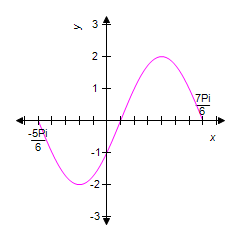
B)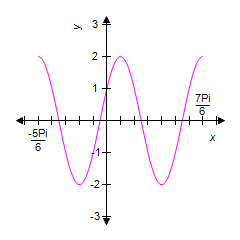
C)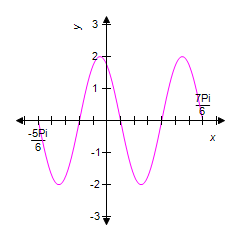
D)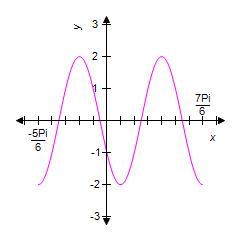
E)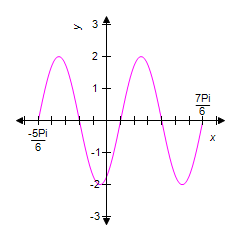

A)

B)

C)

D)

E)


Unlock Deck
Unlock for access to all 156 flashcards in this deck.
Unlock Deck
k this deck
24
Give the amplitude and period of the graph. 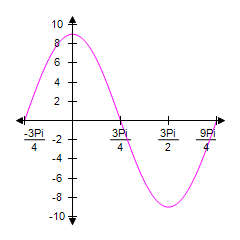
A)Amplitude = 9, period = π .
B)Amplitude = 18, period = 3 π .
C)Amplitude = 9, period = 3 π .
D)Amplitude = 18, period = .
.
E)Amplitude = 18, period = π .

A)Amplitude = 9, period = π .
B)Amplitude = 18, period = 3 π .
C)Amplitude = 9, period = 3 π .
D)Amplitude = 18, period =
 .
.E)Amplitude = 18, period = π .

Unlock Deck
Unlock for access to all 156 flashcards in this deck.
Unlock Deck
k this deck
25
Match between columns

Unlock Deck
Unlock for access to all 156 flashcards in this deck.
Unlock Deck
k this deck
26
Graph one complete cycle of  . Label the axes accurately.
. Label the axes accurately.
A)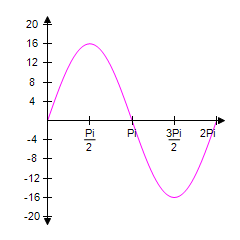
B)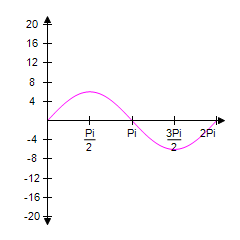
C)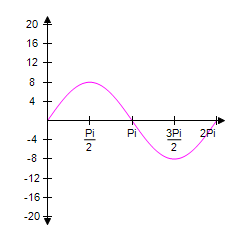
D)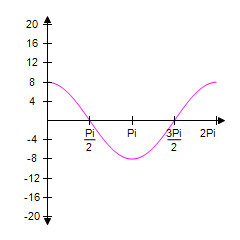
E)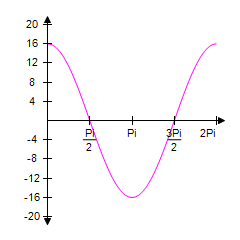
 . Label the axes accurately.
. Label the axes accurately. A)

B)

C)

D)

E)


Unlock Deck
Unlock for access to all 156 flashcards in this deck.
Unlock Deck
k this deck
27
A weight is hung from a spring and set in motion so that it moves up and down continuously. The velocity v of the weight at any time t is given by the equation v = 3.5sin 4 πt where v is measured in meters per second and t is measured in seconds. Find the maximum velocity of the weight and the amount of time it takes for the weight to move from its lowest position to its highest position.
A)The maximum velocity is 3.5 meters per second ; the time it takes for the weight to move from its lowest position to its highest position is seconds.
seconds.
B)The maximum velocity is 3.5 meters per second ; the time it takes for the weight to move from its lowest position to its highest position is seconds.
seconds.
C)The maximum velocity is 7 meters per second ; the time it takes for the weight to move from its lowest position to its highest position is seconds..
seconds..
D)The maximum velocity is 7 meters per second ; the time it takes for the weight to move from its lowest position to its highest position is seconds.
seconds.
E)The maximum velocity is 2.5 meters per second ; the time it takes for the weight to move from its lowest position to its highest position is seconds.
seconds.
A)The maximum velocity is 3.5 meters per second ; the time it takes for the weight to move from its lowest position to its highest position is
 seconds.
seconds.B)The maximum velocity is 3.5 meters per second ; the time it takes for the weight to move from its lowest position to its highest position is
 seconds.
seconds.C)The maximum velocity is 7 meters per second ; the time it takes for the weight to move from its lowest position to its highest position is
 seconds..
seconds..D)The maximum velocity is 7 meters per second ; the time it takes for the weight to move from its lowest position to its highest position is
 seconds.
seconds.E)The maximum velocity is 2.5 meters per second ; the time it takes for the weight to move from its lowest position to its highest position is
 seconds.
seconds.
Unlock Deck
Unlock for access to all 156 flashcards in this deck.
Unlock Deck
k this deck
28
Use the graph of the equation  shown below to identify the graph of one complete cycle of the equation
shown below to identify the graph of one complete cycle of the equation  .
. 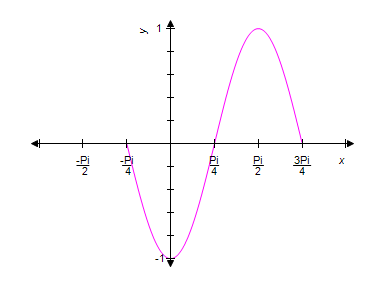
A)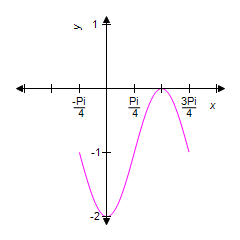
B)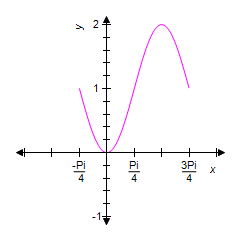
C)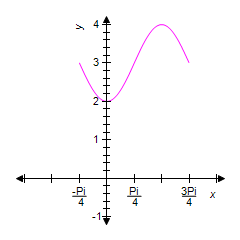
D)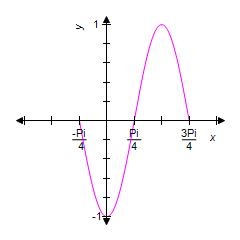
E)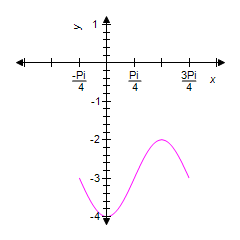
 shown below to identify the graph of one complete cycle of the equation
shown below to identify the graph of one complete cycle of the equation  .
. 
A)

B)

C)

D)

E)


Unlock Deck
Unlock for access to all 156 flashcards in this deck.
Unlock Deck
k this deck
29
Graph one complete cycle for the function. Label the axes so that the amplitude (if defined)and period are easy to read. 
A)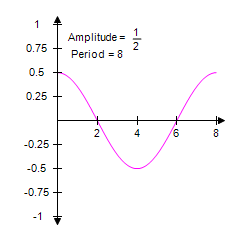
B)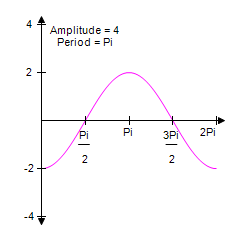
C)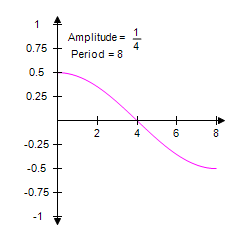
D)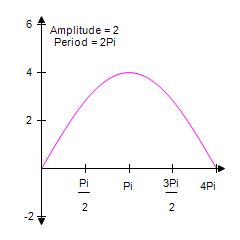
E)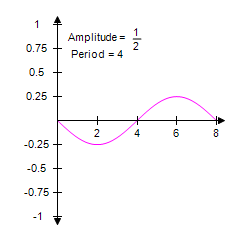

A)

B)

C)

D)

E)


Unlock Deck
Unlock for access to all 156 flashcards in this deck.
Unlock Deck
k this deck
30
Give the amplitude and period of the graph. 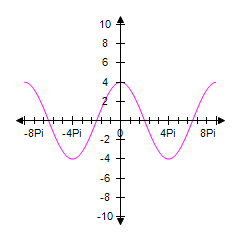
A)Amplitude = 3, period = 4 π .
B)Amplitude = 4, period = .
.
C)Amplitude = 4, period = 4 π .
D)Amplitude = 3, period = 8 π .
E)Amplitude = 4, period = 8 π .

A)Amplitude = 3, period = 4 π .
B)Amplitude = 4, period =
 .
.C)Amplitude = 4, period = 4 π .
D)Amplitude = 3, period = 8 π .
E)Amplitude = 4, period = 8 π .

Unlock Deck
Unlock for access to all 156 flashcards in this deck.
Unlock Deck
k this deck
31
Use the graph of the equation  shown below to identify the graph of one complete cycle of the equation
shown below to identify the graph of one complete cycle of the equation  .
. 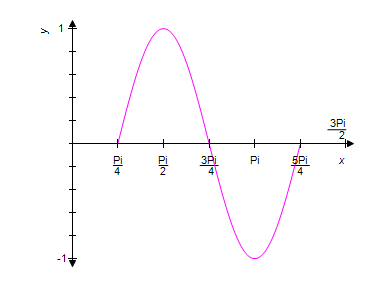
A)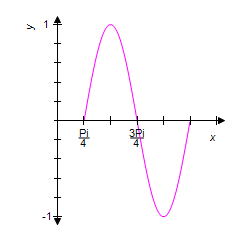
B)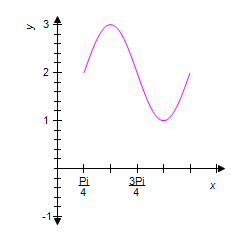
C)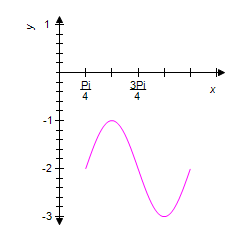
D) 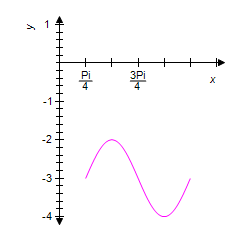
E)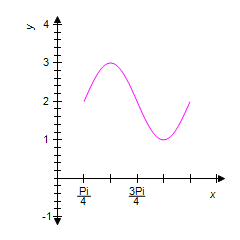
 shown below to identify the graph of one complete cycle of the equation
shown below to identify the graph of one complete cycle of the equation  .
. 
A)

B)

C)

D)

E)


Unlock Deck
Unlock for access to all 156 flashcards in this deck.
Unlock Deck
k this deck
32
Identify the graph of the function y = 2cos πx , 
A)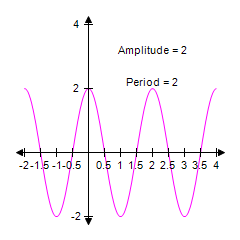
B)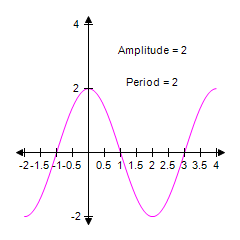
C)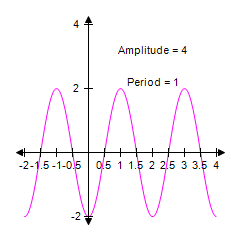
D)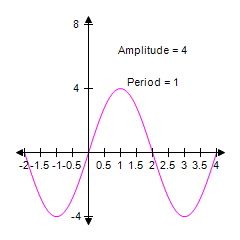
E)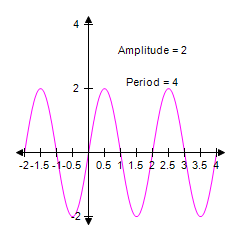

A)

B)

C)

D)

E)


Unlock Deck
Unlock for access to all 156 flashcards in this deck.
Unlock Deck
k this deck
33
Identify the graph of the equation over the given interval. 
A)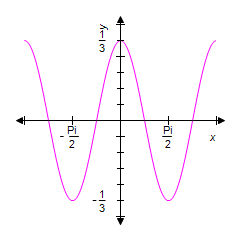
B)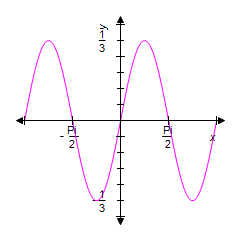
C)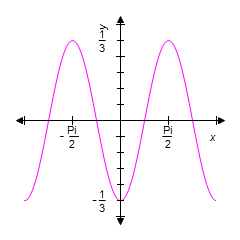
D)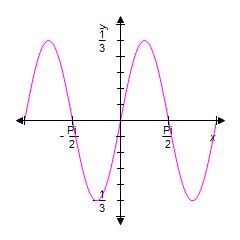
E)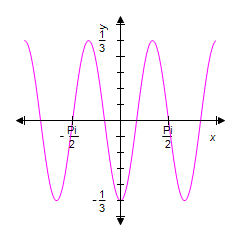

A)

B)

C)

D)

E)


Unlock Deck
Unlock for access to all 156 flashcards in this deck.
Unlock Deck
k this deck
34
The current in an alternating circuit varies in intensity with time. If I represents the intensity of the current and t represents time, then the relationship between I and t is given by I = 20cos 160 πt where I is measured in amperes and t is measured in seconds. Find the maximum value of I and the time it takes for I to go through one complete cycle.
A)The maximum value of I is 40 amperes; one complete cycle takes seconds.
seconds.
B)The maximum value of I is 5 amperes; one complete cycle takes seconds.
seconds.
C)The maximum value of I is 20 amperes; one complete cycle takes seconds.
seconds.
D)The maximum value of I is 40 amperes; one complete cycle takes seconds.
seconds.
E)The maximum value of I is 20 amperes; one complete cycle takes seconds.
seconds.
A)The maximum value of I is 40 amperes; one complete cycle takes
 seconds.
seconds.B)The maximum value of I is 5 amperes; one complete cycle takes
 seconds.
seconds.C)The maximum value of I is 20 amperes; one complete cycle takes
 seconds.
seconds.D)The maximum value of I is 40 amperes; one complete cycle takes
 seconds.
seconds.E)The maximum value of I is 20 amperes; one complete cycle takes
 seconds.
seconds.
Unlock Deck
Unlock for access to all 156 flashcards in this deck.
Unlock Deck
k this deck
35
Identify the graph of the function y = 4sin 2 x
A)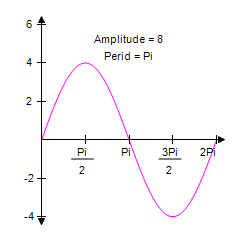
B)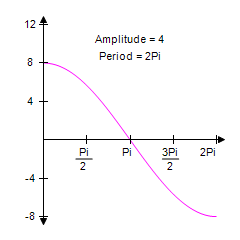
C)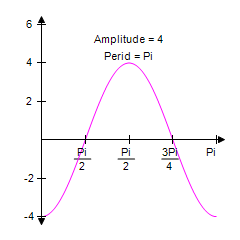
D)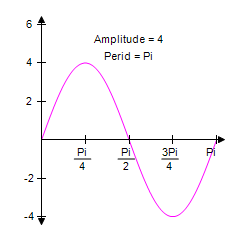
E)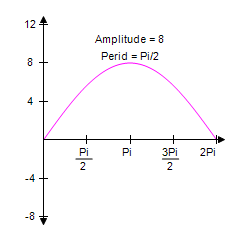
A)

B)

C)

D)

E)


Unlock Deck
Unlock for access to all 156 flashcards in this deck.
Unlock Deck
k this deck
36
Identify the graph of the function 
A)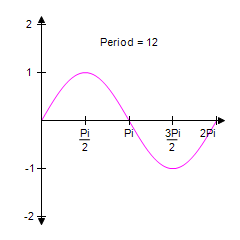
B)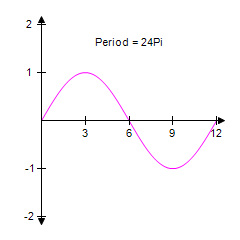
C)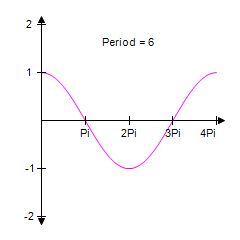
D)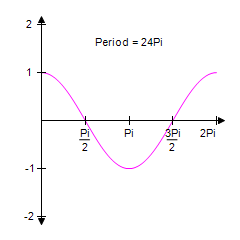
E)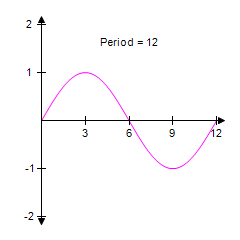

A)

B)

C)

D)

E)


Unlock Deck
Unlock for access to all 156 flashcards in this deck.
Unlock Deck
k this deck
37
Identify the graph of the function 
A)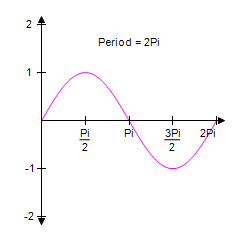
B)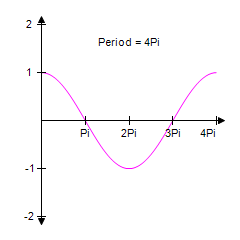
C)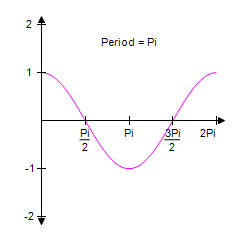
D)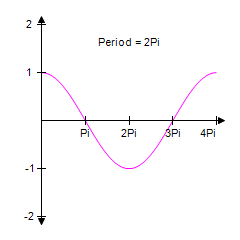
E)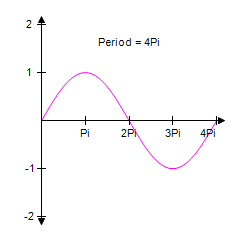

A)

B)

C)

D)

E)


Unlock Deck
Unlock for access to all 156 flashcards in this deck.
Unlock Deck
k this deck
38
Sketch the graph of  from x = 0 to x = 2 π by making a table using multiples of
from x = 0 to x = 2 π by making a table using multiples of  for x .
for x .
A)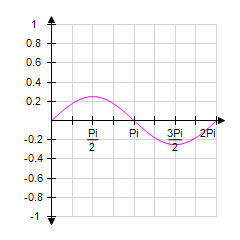
B)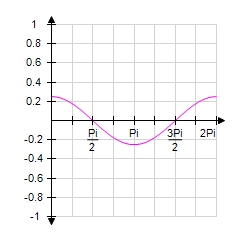
C)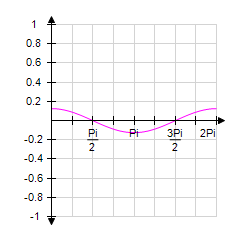
D)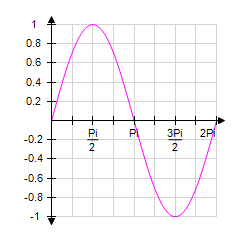
E)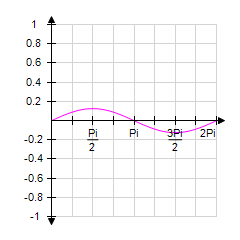
 from x = 0 to x = 2 π by making a table using multiples of
from x = 0 to x = 2 π by making a table using multiples of  for x .
for x . A)

B)

C)

D)

E)


Unlock Deck
Unlock for access to all 156 flashcards in this deck.
Unlock Deck
k this deck
39
Match between columns

Unlock Deck
Unlock for access to all 156 flashcards in this deck.
Unlock Deck
k this deck
40
Use the graph of the equation  shown below to identify the graph of one complete cycle of the equation
shown below to identify the graph of one complete cycle of the equation  .
. 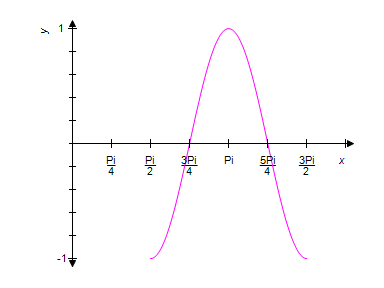
A)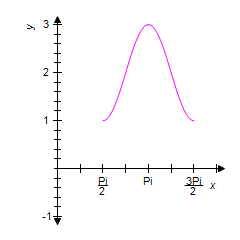
B)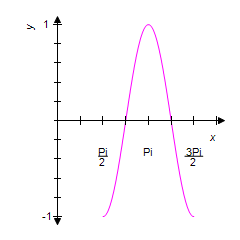
C)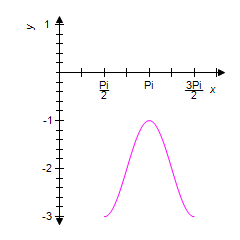
D)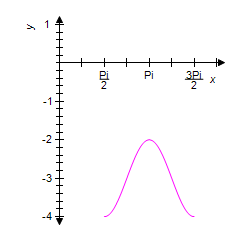
E)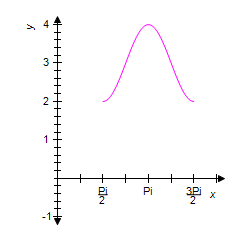
 shown below to identify the graph of one complete cycle of the equation
shown below to identify the graph of one complete cycle of the equation  .
. 
A)

B)

C)

D)

E)


Unlock Deck
Unlock for access to all 156 flashcards in this deck.
Unlock Deck
k this deck
41
Identify the correct graph of the function: 
A)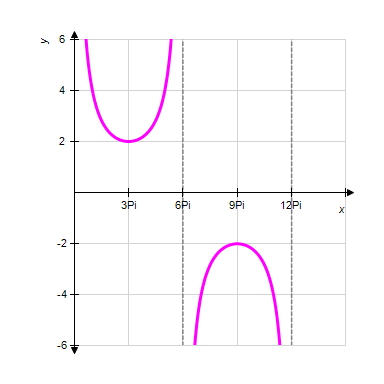

B)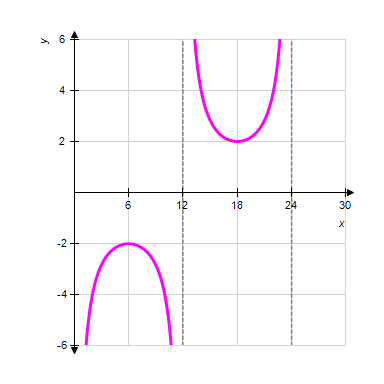

C) 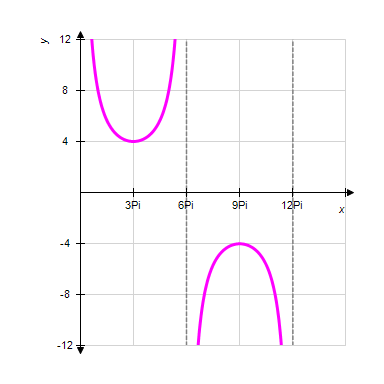

D)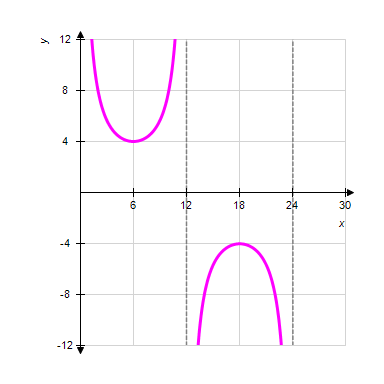

E)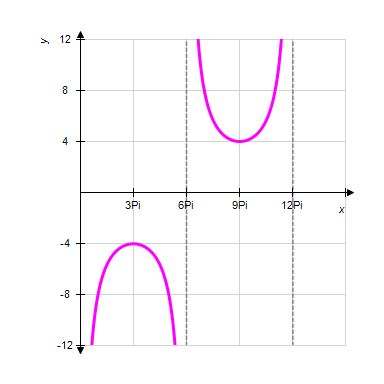


A)


B)


C)


D)


E)



Unlock Deck
Unlock for access to all 156 flashcards in this deck.
Unlock Deck
k this deck
42
The periods for  and
and  are π . The graphs of
are π . The graphs of  and
and  will have periods
will have periods  and phase shifts
and phase shifts  , for
, for  Use these facts to identify the graph of the function
Use these facts to identify the graph of the function 
A)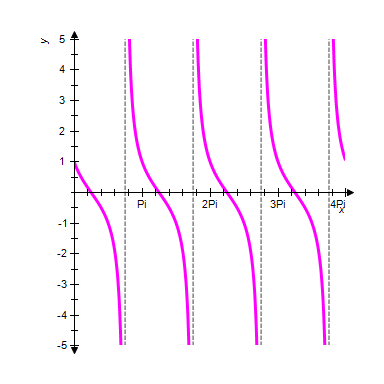
B)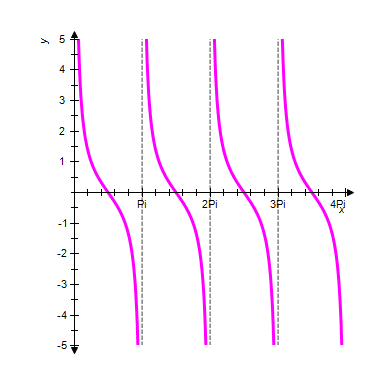
C) 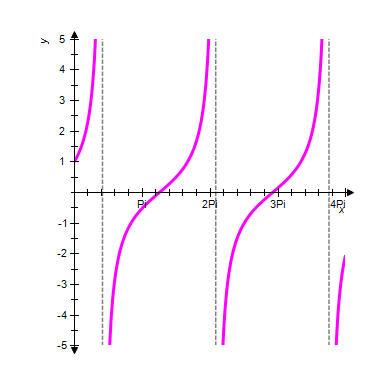
D)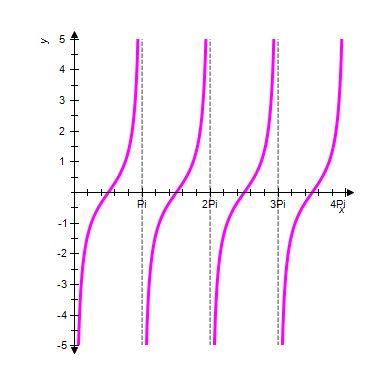
E)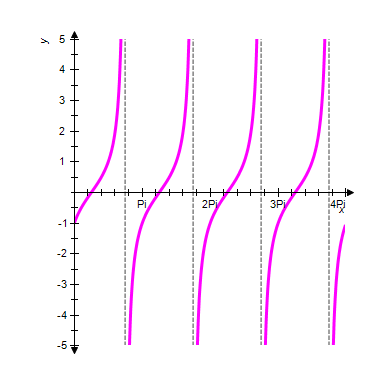
 and
and  are π . The graphs of
are π . The graphs of  and
and  will have periods
will have periods  and phase shifts
and phase shifts  , for
, for  Use these facts to identify the graph of the function
Use these facts to identify the graph of the function 
A)

B)

C)

D)

E)


Unlock Deck
Unlock for access to all 156 flashcards in this deck.
Unlock Deck
k this deck
43
Graph one complete cycle of  . Label the axes accurately.
. Label the axes accurately.
A)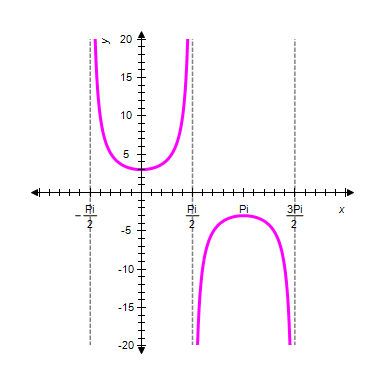
B)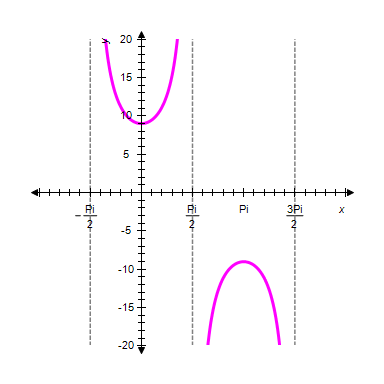
C) 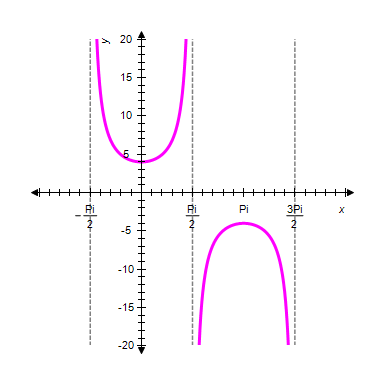
D) 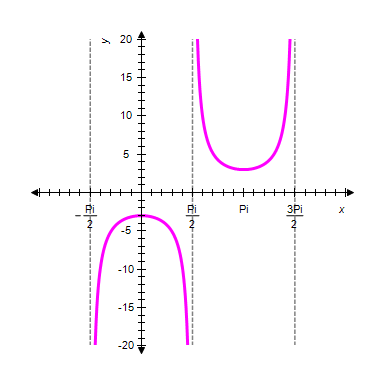
E) 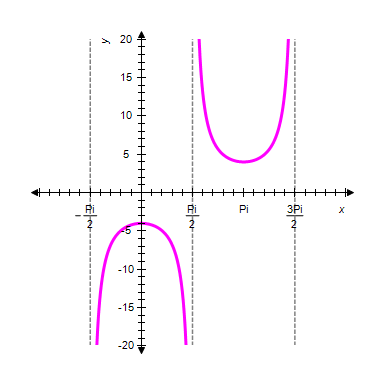
 . Label the axes accurately.
. Label the axes accurately. A)

B)

C)

D)

E)


Unlock Deck
Unlock for access to all 156 flashcards in this deck.
Unlock Deck
k this deck
44
Identify the graph of the function 
A)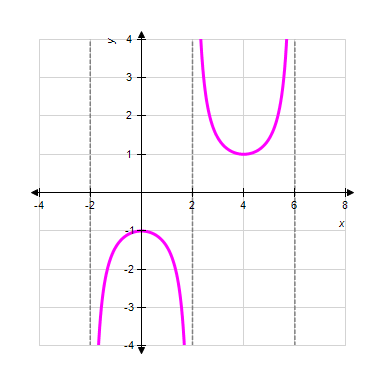
Period = 8
B)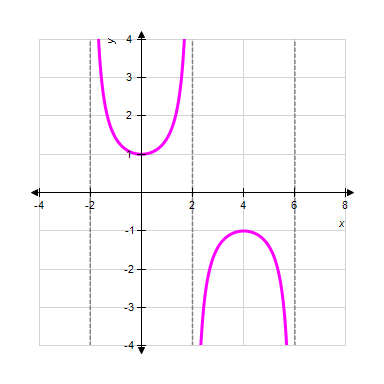 Period = 8
Period = 8
C)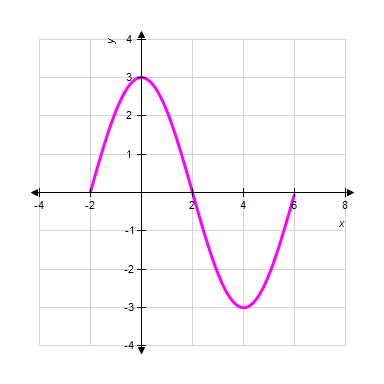
Period = 8
D)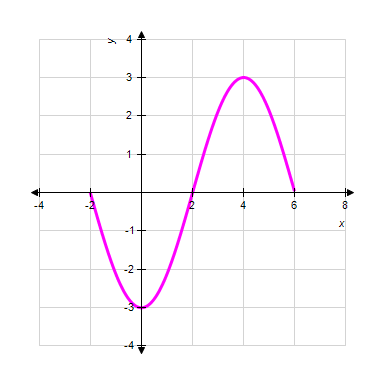
Period = 8
E)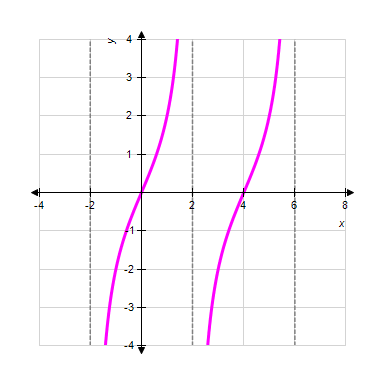
Period = 8

A)

Period = 8
B)
 Period = 8
Period = 8C)

Period = 8
D)

Period = 8
E)

Period = 8

Unlock Deck
Unlock for access to all 156 flashcards in this deck.
Unlock Deck
k this deck
45
The periods for  and
and  are π . The graphs of
are π . The graphs of  and
and  will have periods
will have periods  and phase shifts
and phase shifts  , for
, for  Use these facts to identify the graph of the function
Use these facts to identify the graph of the function 
A)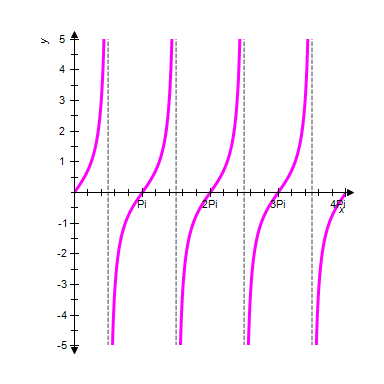
B)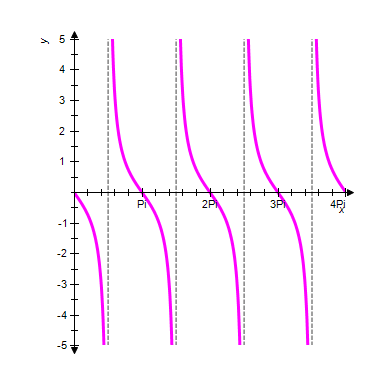
C)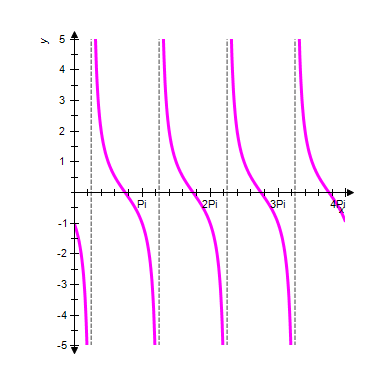
D)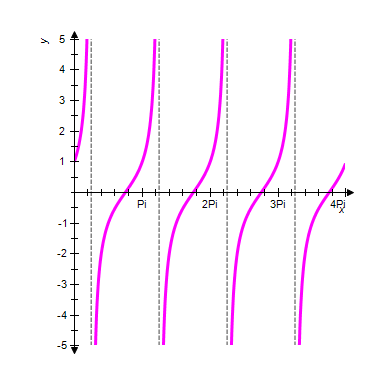
E)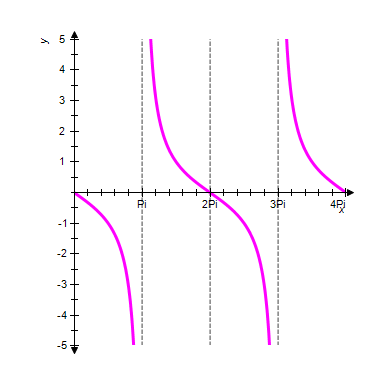
 and
and  are π . The graphs of
are π . The graphs of  and
and  will have periods
will have periods  and phase shifts
and phase shifts  , for
, for  Use these facts to identify the graph of the function
Use these facts to identify the graph of the function 
A)

B)

C)

D)

E)


Unlock Deck
Unlock for access to all 156 flashcards in this deck.
Unlock Deck
k this deck
46
Identify the amplitude and phase shift for the equation. 
A)Amplitude = 4 Phase shift =
B)Amplitude = 1 Phase shift =
C)Amplitude = 5 Phase shift =
D)Amplitude = 4 Phase shift =
E)Amplitude = 1 Phase shift =

A)Amplitude = 4 Phase shift =

B)Amplitude = 1 Phase shift =

C)Amplitude = 5 Phase shift =

D)Amplitude = 4 Phase shift =

E)Amplitude = 1 Phase shift =


Unlock Deck
Unlock for access to all 156 flashcards in this deck.
Unlock Deck
k this deck
47
Identify the graph of the function 
A) 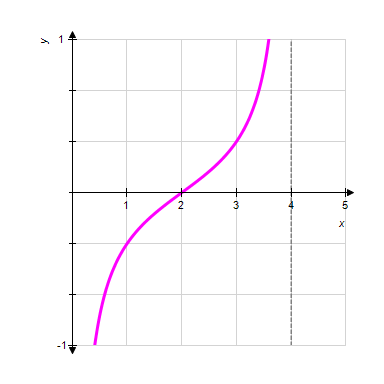

B)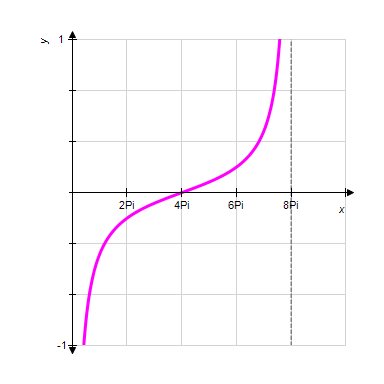

C)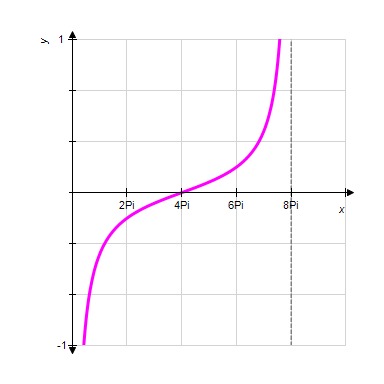

D)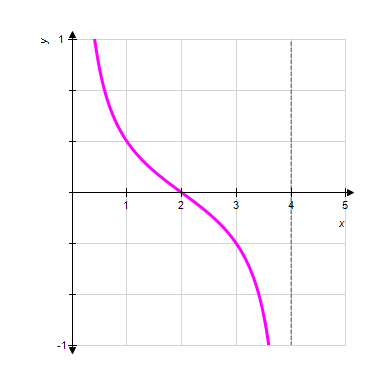

E)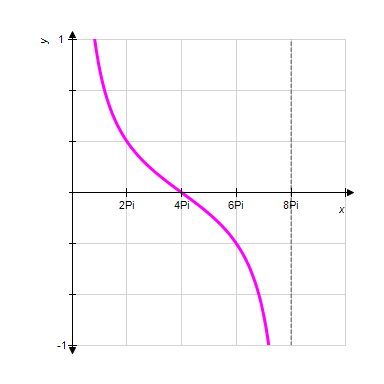


A)


B)


C)


D)


E)



Unlock Deck
Unlock for access to all 156 flashcards in this deck.
Unlock Deck
k this deck
48
Identify the graph of 
A)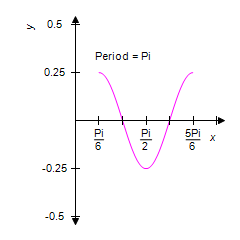
B)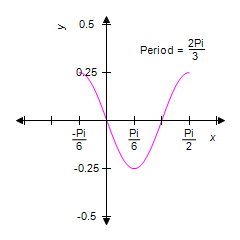
C)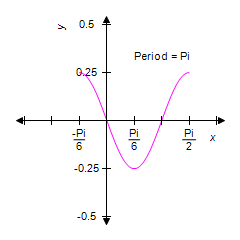
D)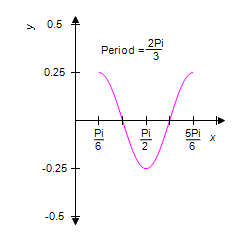
E)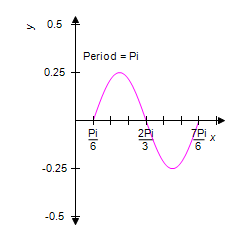

A)

B)

C)

D)

E)


Unlock Deck
Unlock for access to all 156 flashcards in this deck.
Unlock Deck
k this deck
49
Identify the amplitude and phase shift for this equation. 
A)Amplitude = 3 Phase shift =
B)Amplitude = 2 Phase shift =
C)Amplitude = 2 Phase shift =
D)Amplitude = 2 Phase shift =
E)Amplitude = 2 Phase shift =

A)Amplitude = 3 Phase shift =

B)Amplitude = 2 Phase shift =

C)Amplitude = 2 Phase shift =

D)Amplitude = 2 Phase shift =

E)Amplitude = 2 Phase shift =


Unlock Deck
Unlock for access to all 156 flashcards in this deck.
Unlock Deck
k this deck
50
Identify the graph of the equation over the given interval. 
A)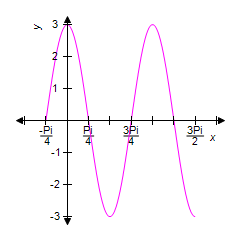
B)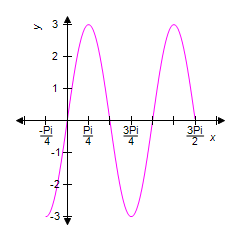
C)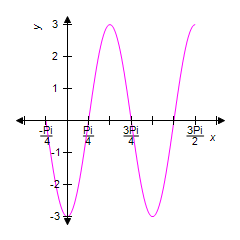
D)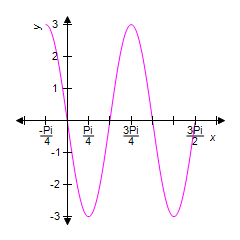
E)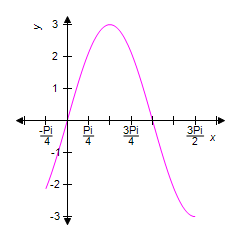

A)

B)

C)

D)

E)


Unlock Deck
Unlock for access to all 156 flashcards in this deck.
Unlock Deck
k this deck
51
For the given equation, first identify the phase shift and then sketch one complete cycle of the graph. Graph  on the same coordinate system.
on the same coordinate system. 
A)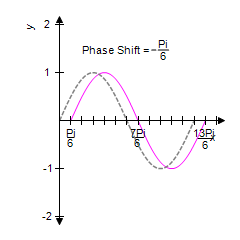
B)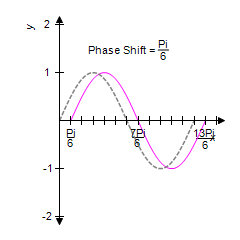
C)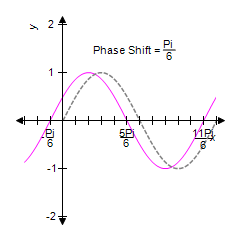
D)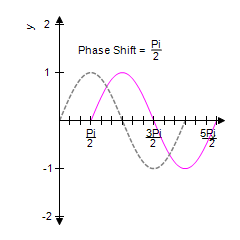
E)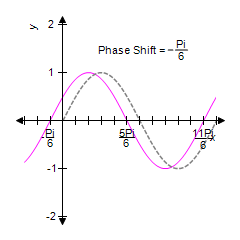
 on the same coordinate system.
on the same coordinate system. 
A)

B)

C)

D)

E)


Unlock Deck
Unlock for access to all 156 flashcards in this deck.
Unlock Deck
k this deck
52
For the given equation, first identify the phase shift and then sketch one complete cycle of the graph. Graph y = cos x on the same coordinate system. 
A)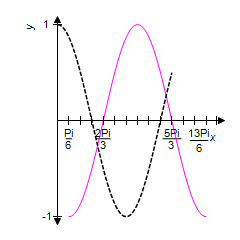 Phase Shift =
Phase Shift = 
B)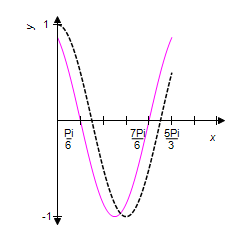 Phase Shift =
Phase Shift = 
C)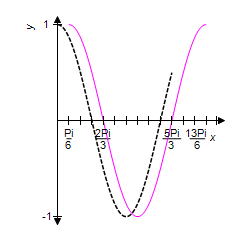 Phase Shift =
Phase Shift = 
D)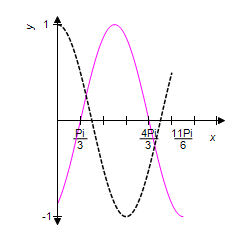 Phase Shift =
Phase Shift = 
E)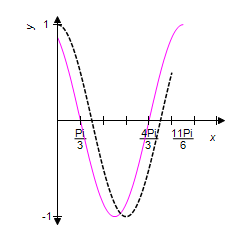 Phase Shift =
Phase Shift = 

A)
 Phase Shift =
Phase Shift = 
B)
 Phase Shift =
Phase Shift = 
C)
 Phase Shift =
Phase Shift = 
D)
 Phase Shift =
Phase Shift = 
E)
 Phase Shift =
Phase Shift = 

Unlock Deck
Unlock for access to all 156 flashcards in this deck.
Unlock Deck
k this deck
53
Identify the graph of the equation. 
A)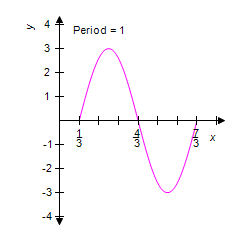
B)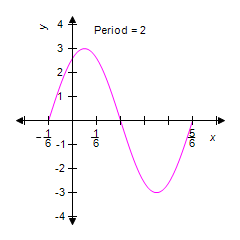
C) 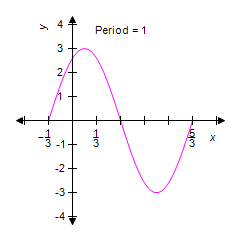
D)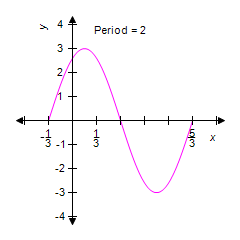
E)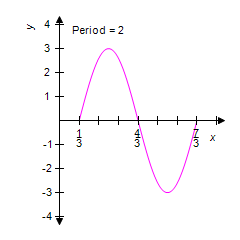

A)

B)

C)

D)

E)


Unlock Deck
Unlock for access to all 156 flashcards in this deck.
Unlock Deck
k this deck
54
Sketch one complete cycle of the following function by first graphing the appropriate sine or cosine curve and then using the reciprocal relationships. 
A)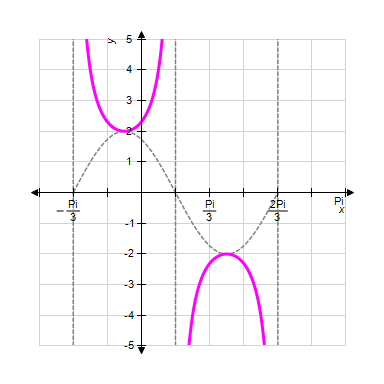
B)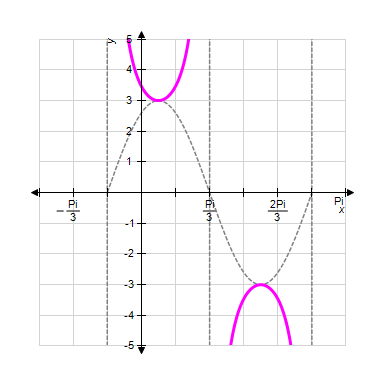
C) 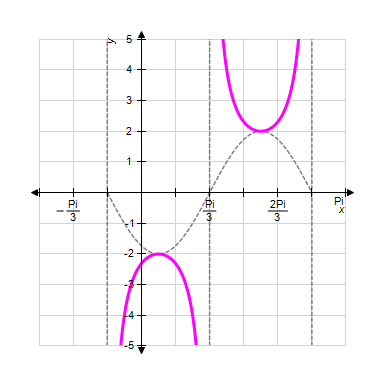
D) 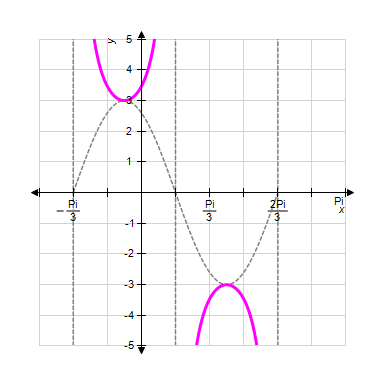
E) 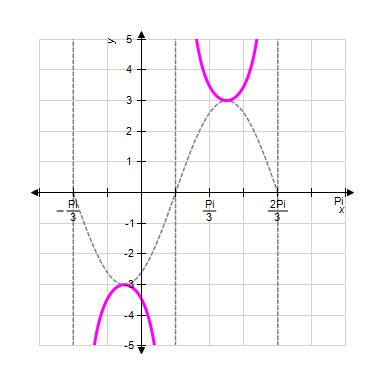

A)

B)

C)

D)

E)


Unlock Deck
Unlock for access to all 156 flashcards in this deck.
Unlock Deck
k this deck
55
Graph one complete cycle of the graph. Label the axes accurately and identify the period. 
A) 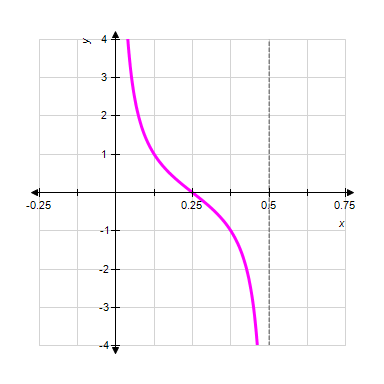

B)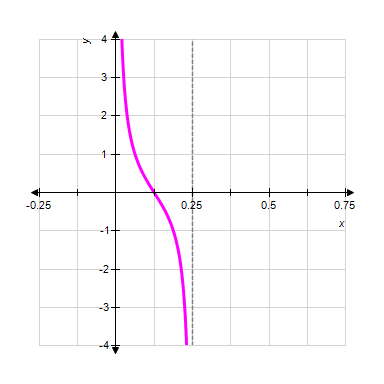

C)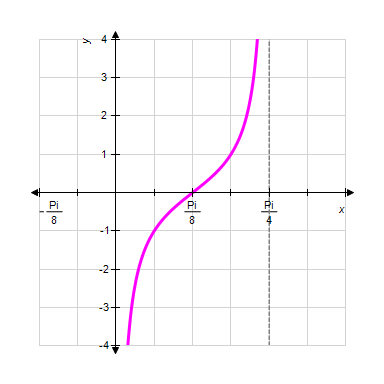

D)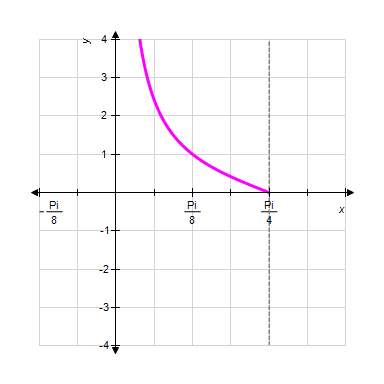

E)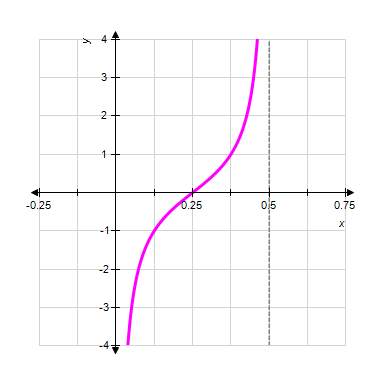


A)


B)


C)


D)


E)



Unlock Deck
Unlock for access to all 156 flashcards in this deck.
Unlock Deck
k this deck
56
Use the graph of the equation  shown below to identify the graph of one complete cycle of the equation
shown below to identify the graph of one complete cycle of the equation  .
. 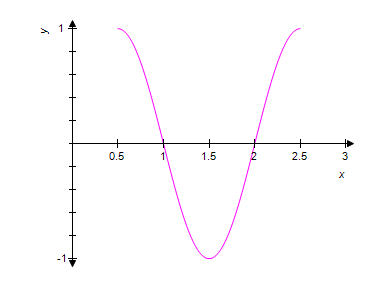
A)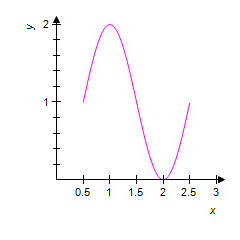
B)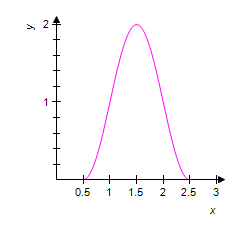
C)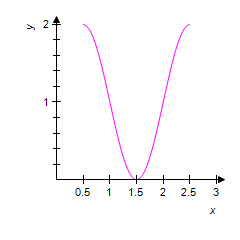
D)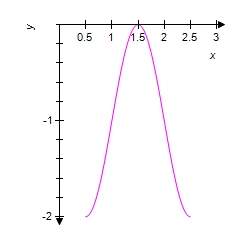
E)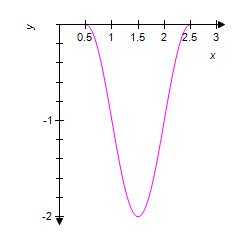
 shown below to identify the graph of one complete cycle of the equation
shown below to identify the graph of one complete cycle of the equation  .
. 
A)

B)

C)

D)

E)


Unlock Deck
Unlock for access to all 156 flashcards in this deck.
Unlock Deck
k this deck
57
For the given equation, first identify the phase shift and then sketch one complete cycle of the graph. Graph y = sin x on the same coordinate system. 
A)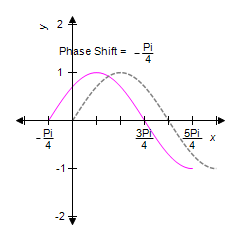
B)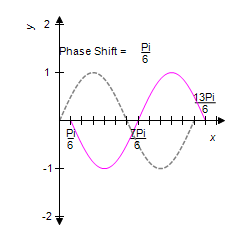
C)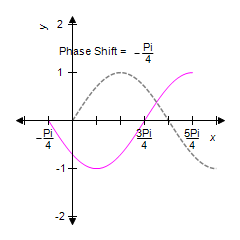
D)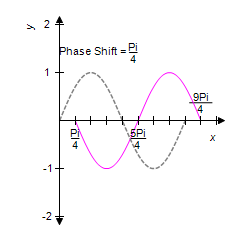
E) 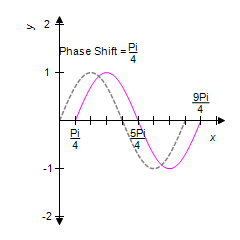

A)

B)

C)

D)

E)


Unlock Deck
Unlock for access to all 156 flashcards in this deck.
Unlock Deck
k this deck
58
Graph one complete cycle of  . Label the axes accurately.
. Label the axes accurately.
A)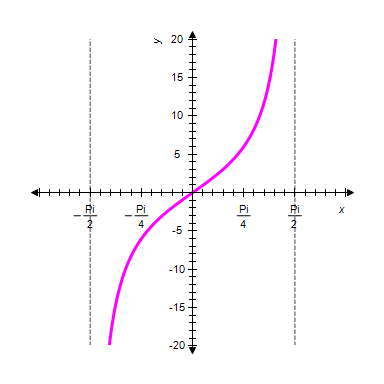
B)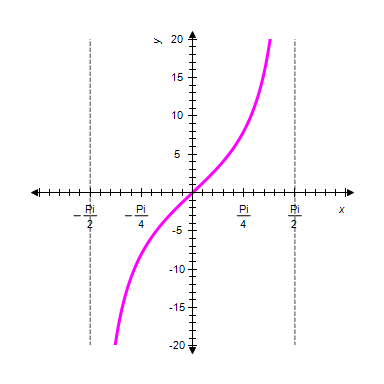
C)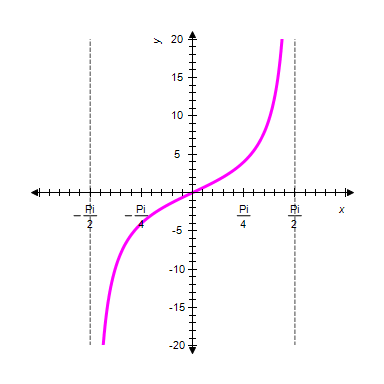
D)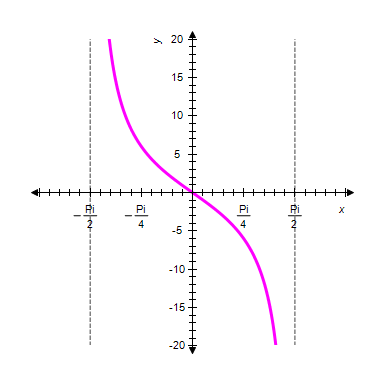
E)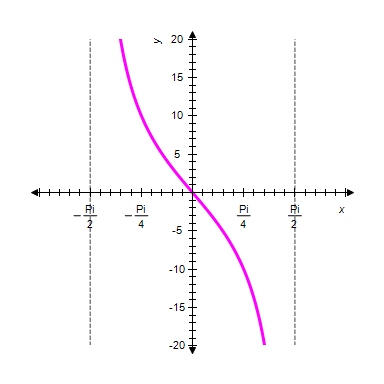
 . Label the axes accurately.
. Label the axes accurately. A)

B)

C)

D)

E)


Unlock Deck
Unlock for access to all 156 flashcards in this deck.
Unlock Deck
k this deck
59
Using the graph of  for reference, select the correct graph for
for reference, select the correct graph for  .
. 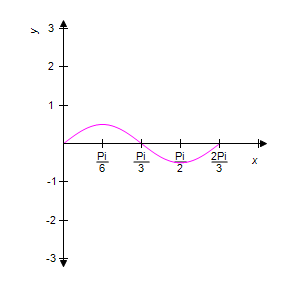
A)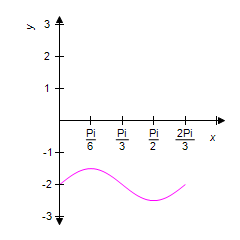
B)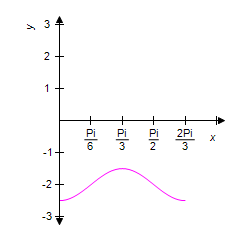
C)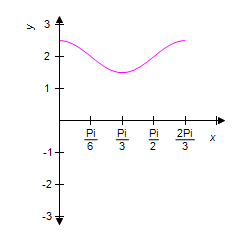
D)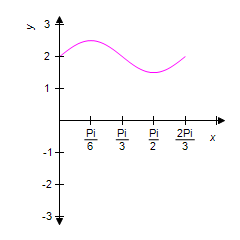
E)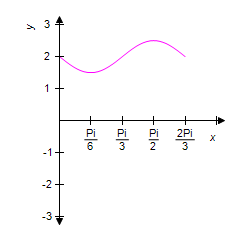
 for reference, select the correct graph for
for reference, select the correct graph for  .
. 
A)

B)

C)

D)

E)


Unlock Deck
Unlock for access to all 156 flashcards in this deck.
Unlock Deck
k this deck
60
For the given equation, first identify the phase shift and then sketch one complete cycle of the graph. In each case, graph y = cos x on the same coordinate system. 
A)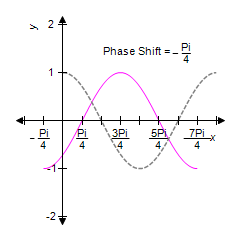
B)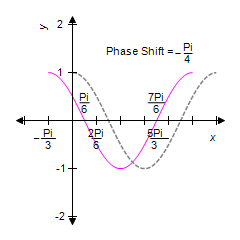
C)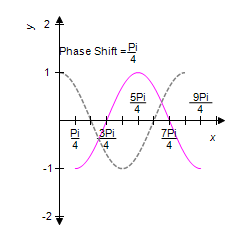
D)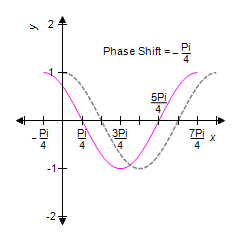
E) 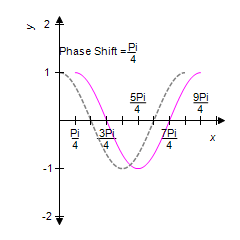

A)

B)

C)

D)

E)


Unlock Deck
Unlock for access to all 156 flashcards in this deck.
Unlock Deck
k this deck
61
The graph below is one complete cycle of the graph of an equation containing a trigonometric function. Find an equation to match the graph. If you are using a graphing calculator, graph your equation to verify that it is correct. 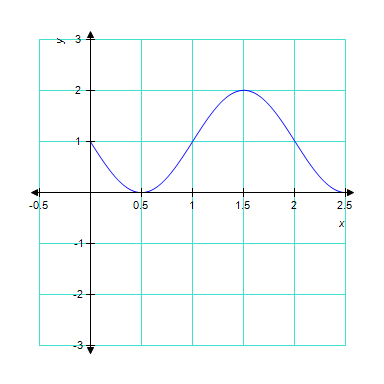
A)
B)
C)
D)
E)

A)

B)

C)

D)

E)


Unlock Deck
Unlock for access to all 156 flashcards in this deck.
Unlock Deck
k this deck
62
Find the equation of the line. Write your answer in slope-intercept form,  .
. 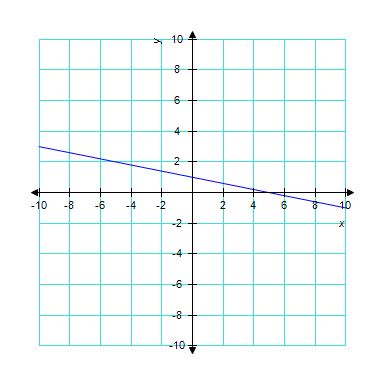
 .
. 

Unlock Deck
Unlock for access to all 156 flashcards in this deck.
Unlock Deck
k this deck
63
The graph below is one complete cycle of the graph of an equation containing a trigonometric function. Find an equation to match the graph. If you are using a graphing calculator, graph your equation to verify that it is correct. 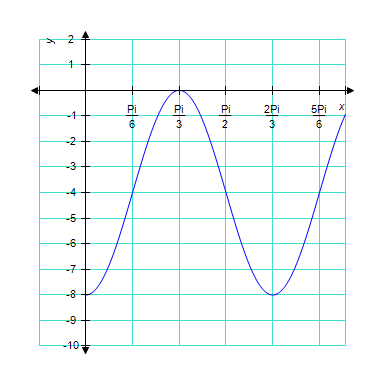
A)
B)
C)
D)
E)

A)

B)

C)

D)

E)


Unlock Deck
Unlock for access to all 156 flashcards in this deck.
Unlock Deck
k this deck
64
The diameter of a Ferris wheel is 161 feet, it rotates at 0.05 revolutions per minute, and the bottom of the wheel is 7 feet above the ground. Find an expression that gives a passenger's height above the ground at any time t (in minutes)during the ride. Assume the passenger starts the ride at the bottom of the wheel.
A)
B)
C)
D)
E)
A)

B)

C)

D)

E)


Unlock Deck
Unlock for access to all 156 flashcards in this deck.
Unlock Deck
k this deck
65
The graph below is one complete cycle of the graph of an equation containing a trigonometric function. Find an equation to match the graph. If you are using a graphing calculator, graph your equation to verify that it is correct. 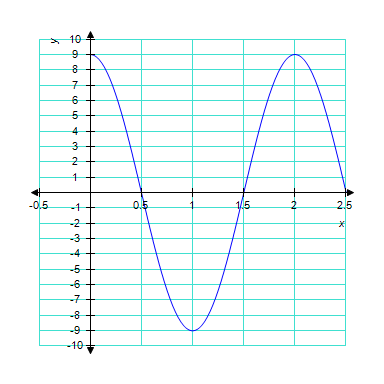
A)
B)
C)
D)
E)

A)

B)

C)

D)

E)


Unlock Deck
Unlock for access to all 156 flashcards in this deck.
Unlock Deck
k this deck
66
The graph below is one complete cycle of the graph of an equation containing a trigonometric function. Find an equation to match the graph. If you are using a graphing calculator, graph your equation to verify that it is correct. 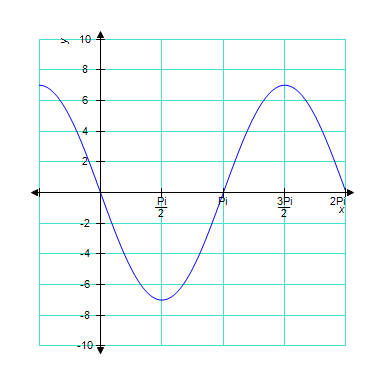
A)
B)
C)
D)
E)

A)

B)

C)

D)

E)


Unlock Deck
Unlock for access to all 156 flashcards in this deck.
Unlock Deck
k this deck
67
Find the equation of the line. Write your answer in slope-intercept form,  .
. 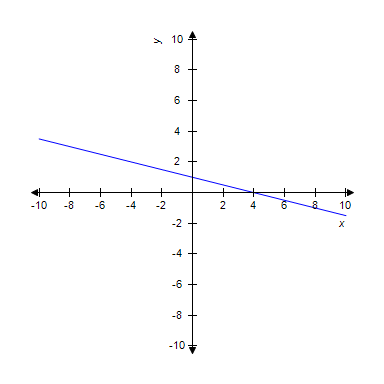
A)
B)
C)
D)
E)
 .
. 
A)

B)

C)

D)

E)


Unlock Deck
Unlock for access to all 156 flashcards in this deck.
Unlock Deck
k this deck
68
The graph below is one complete cycle of the graph of an equation containing a trigonometric function. Find an equation to match the graph. If you are using a graphing calculator, graph your equation to verify that it is correct. 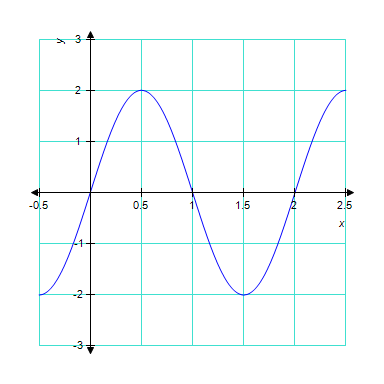
A)
B)
C)
D)
E)

A)

B)

C)

D)

E)


Unlock Deck
Unlock for access to all 156 flashcards in this deck.
Unlock Deck
k this deck
69
The graph below is one complete cycle of the graph of an equation containing a trigonometric function. Find an equation to match the graph. If you are using a graphing calculator, graph your equation to verify that it is correct.
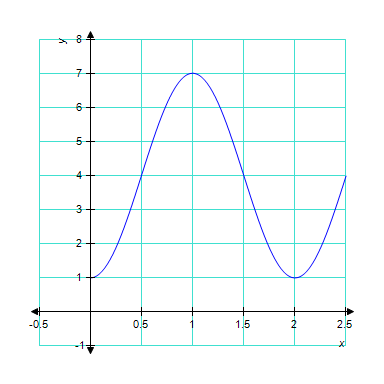
A)
B)
C)
D)
E)

A)

B)

C)

D)

E)


Unlock Deck
Unlock for access to all 156 flashcards in this deck.
Unlock Deck
k this deck
70
The graph below is one complete cycle of the graph of an equation containing a trigonometric function. Find an equation to match the graph. If you are using a graphing calculator, graph your equation to verify that it is correct. 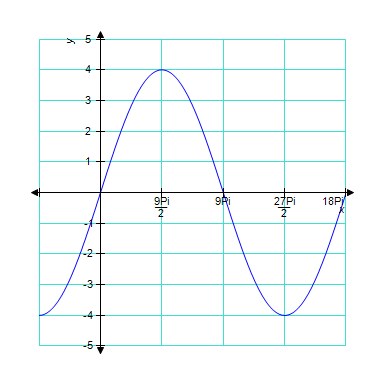
A)
B)
C)
D)
E)

A)

B)

C)

D)

E)


Unlock Deck
Unlock for access to all 156 flashcards in this deck.
Unlock Deck
k this deck
71
The graph below is one complete cycle of the graph of an equation containing a trigonometric function. Find an equation to match the graph. If you are using a graphing calculator, graph your equation to verify that it is correct. 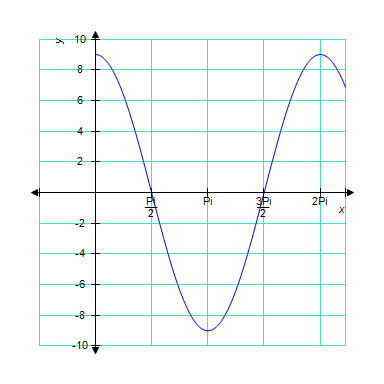


Unlock Deck
Unlock for access to all 156 flashcards in this deck.
Unlock Deck
k this deck
72
The graph below is one complete cycle of the graph of an equation containing a trigonometric function. Find an equation to match the graph. If you are using a graphing calculator, graph your equation to verify that it is correct. 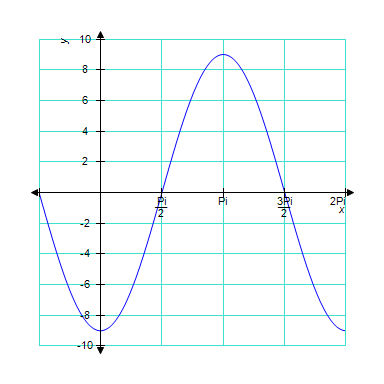
A)
B)
C)
D)
E)

A)

B)

C)

D)

E)


Unlock Deck
Unlock for access to all 156 flashcards in this deck.
Unlock Deck
k this deck
73
The graph below is one complete cycle of the graph of an equation containing a trigonometric function. Find an equation to match the graph. If you are using a graphing calculator, graph your equation to verify that it is correct. 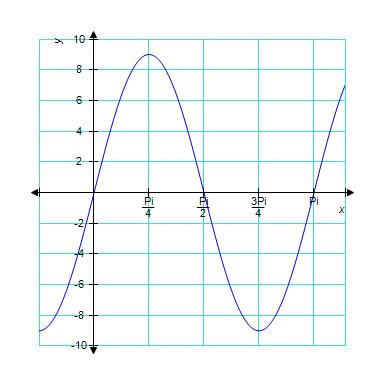
A)
B)
C)
D)
E)

A)

B)

C)

D)

E)


Unlock Deck
Unlock for access to all 156 flashcards in this deck.
Unlock Deck
k this deck
74
The graph below is one complete cycle of the graph of an equation containing a trigonometric function. Find an equation to match the graph. If you are using a graphing calculator, graph your equation to verify that it is correct. 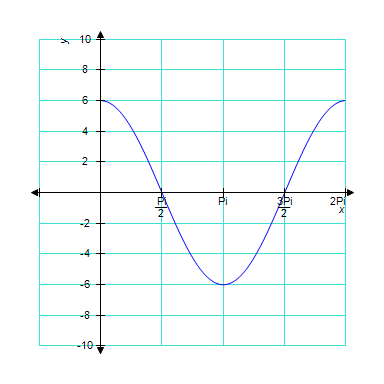
A)
B)
C)
D)
E)

A)

B)

C)

D)

E)


Unlock Deck
Unlock for access to all 156 flashcards in this deck.
Unlock Deck
k this deck
75
The graph below is one complete cycle of the graph of an equation containing a trigonometric function. Find an equation to match the graph. If you are using a graphing calculator, graph your equation to verify that it is correct. 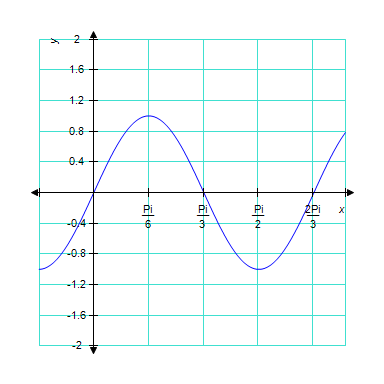
A)
B)
C)
D)
E)

A)

B)

C)

D)

E)


Unlock Deck
Unlock for access to all 156 flashcards in this deck.
Unlock Deck
k this deck
76
The graph below is one complete cycle of the graph of an equation containing a trigonometric function. Find an equation to match the graph. If you are using a graphing calculator, graph your equation to verify that it is correct. 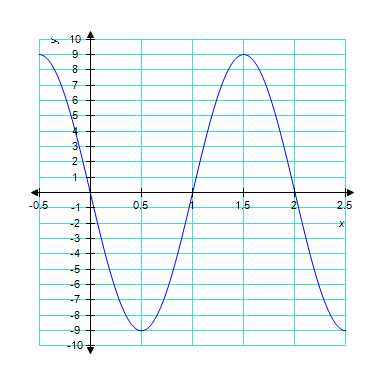
A)
B)
C)
D)
E)

A)

B)

C)

D)

E)


Unlock Deck
Unlock for access to all 156 flashcards in this deck.
Unlock Deck
k this deck
77
The graph below is one complete cycle of the graph of an equation containing a trigonometric function. Find an equation to match the graph. If you are using a graphing calculator, graph your equation to verify that it is correct. 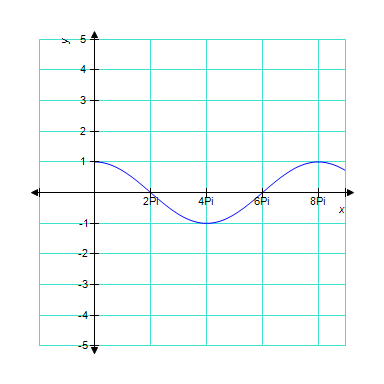
A)
B)
C)
D)
E)

A)

B)

C)

D)

E)


Unlock Deck
Unlock for access to all 156 flashcards in this deck.
Unlock Deck
k this deck
78
The graph below is one complete cycle of the graph of an equation containing a trigonometric function. Find an equation to match the graph. If you are using a graphing calculator, graph your equation to verify that it is correct. 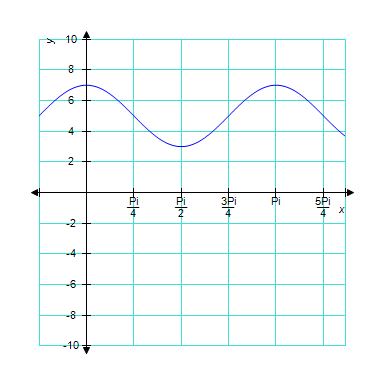
A)
B)
C)
D)
E)

A)

B)

C)

D)

E)


Unlock Deck
Unlock for access to all 156 flashcards in this deck.
Unlock Deck
k this deck
79
The graph below is one complete cycle of the graph of an equation containing a trigonometric function. Find an equation to match the graph. If you are using a graphing calculator, graph your equation to verify that it is correct. 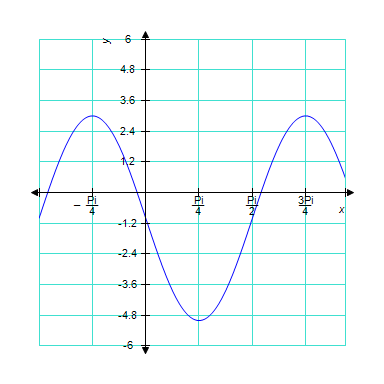
A)
B)
C)
D)
E)

A)

B)

C)

D)

E)


Unlock Deck
Unlock for access to all 156 flashcards in this deck.
Unlock Deck
k this deck
80
Sketch one complete cycle of the following function by first graphing the appropriate sine or cosine curve and then using the reciprocal relationships. 
A)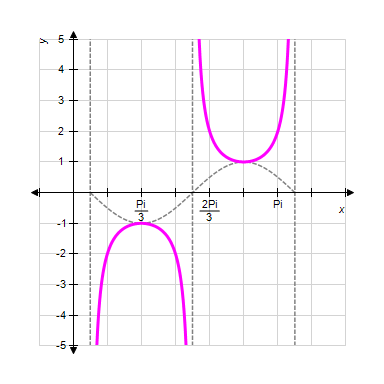
B)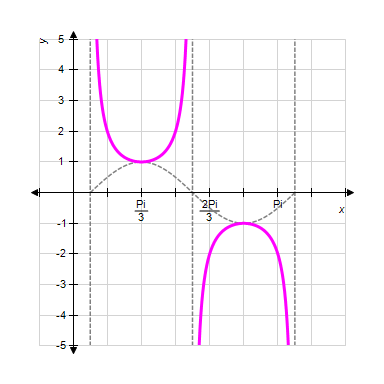
C) 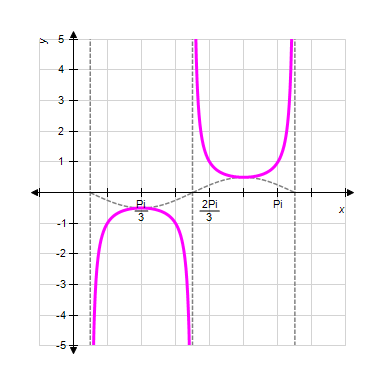
D) 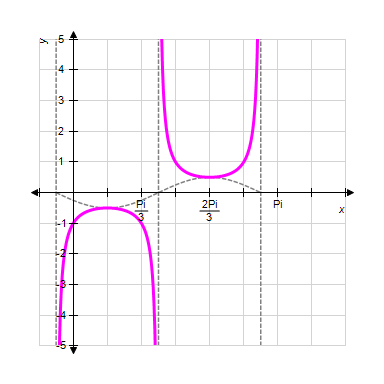
E) 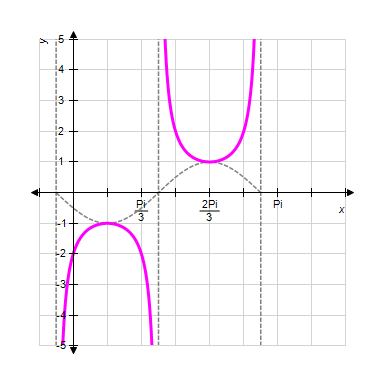

A)

B)

C)

D)

E)


Unlock Deck
Unlock for access to all 156 flashcards in this deck.
Unlock Deck
k this deck






